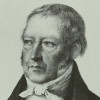“ Man, therefore, is always thinking, even in his perceptions: if he observes anything, he always observes it as a universal, fixes on a single point which he places in relief, thus withdrawing his attention from other points, and takes it as abstract and universal, even if the universality be only in form. ”
Georg Wilhelm Friedrich Hegel, Science of Logic (1816). copy citation
| Author | Georg Wilhelm Friedrich Hegel |
|---|---|
| Source | Science of Logic |
| Topic | universality perception |
| Date | 1816 |
| Language | English |
| Reference | |
| Note | Translated by William Wallace |
| Weblink | http://www.gutenberg.org/files/55108/55108-h/55108-h.htm |
Context
“Now in the 'Ego' there are a variety of contents, derived both from within and from, without, and according to the nature of these contents our state may be described as perception, or conception, or reminiscence. But in all of them the 'I' is found: or in them all thought is present. Man, therefore, is always thinking, even in his perceptions: if he observes anything, he always observes it as a universal, fixes on a single point which he places in relief, thus withdrawing his attention from other points, and takes it as abstract and universal, even if the universality be only in form.
In the case of our ordinary conceptions, two things may happen. Either the contents are moulded by thought, but not the form: or, the form belongs to thought and not the [Pg 49] contents. In using such terms, for instance, as anger, rose, hope, I am speaking of things which I have learnt in the way of sensation, but I express these contents in a universal mode, that is, in the form of thought.”
source


